Unveiling Your Competitors' Secrets
Want to outperform your rivals? Understanding their online strategies is key. Competitor website analysis tools provide the insights you need to identify opportunities and refine your approach. This listicle showcases eight leading competitor website analysis tools- from Semrush and Ahrefs to SpyFu and BuzzSumo- to help you uncover your competitors' secrets and gain a competitive edge. Discover how these tools can help analyze everything from SEO and content marketing to website traffic and social media engagement. Let's dive in!
Add on-page insights with the SEO audit tool for on-page insights. Need a quick baseline before the deep dive? Try the competition analysis website to review likely UX, copy, and SEO gaps.
1. Roast My Web
Roast My Web is a powerful AI-driven competitor website analysis tool specifically designed for freelancers, digital agencies, solopreneurs, and anyone looking to streamline website audits and generate client-ready reports quickly. This innovative platform automates the often tedious manual audit process, allowing you to save valuable time while delivering polished, branded PDF reports. These reports highlight actionable insights across key areas like design, user experience (UX), conversion rate optimization, mobile responsiveness, and SEO effectiveness. By automating competitor performance comparisons, Roast My Web provides a crucial edge in understanding market dynamics and identifying opportunities for improvement. This enables you to present data-backed recommendations for maximizing client ROI, ultimately boosting your credibility and helping you win more business.
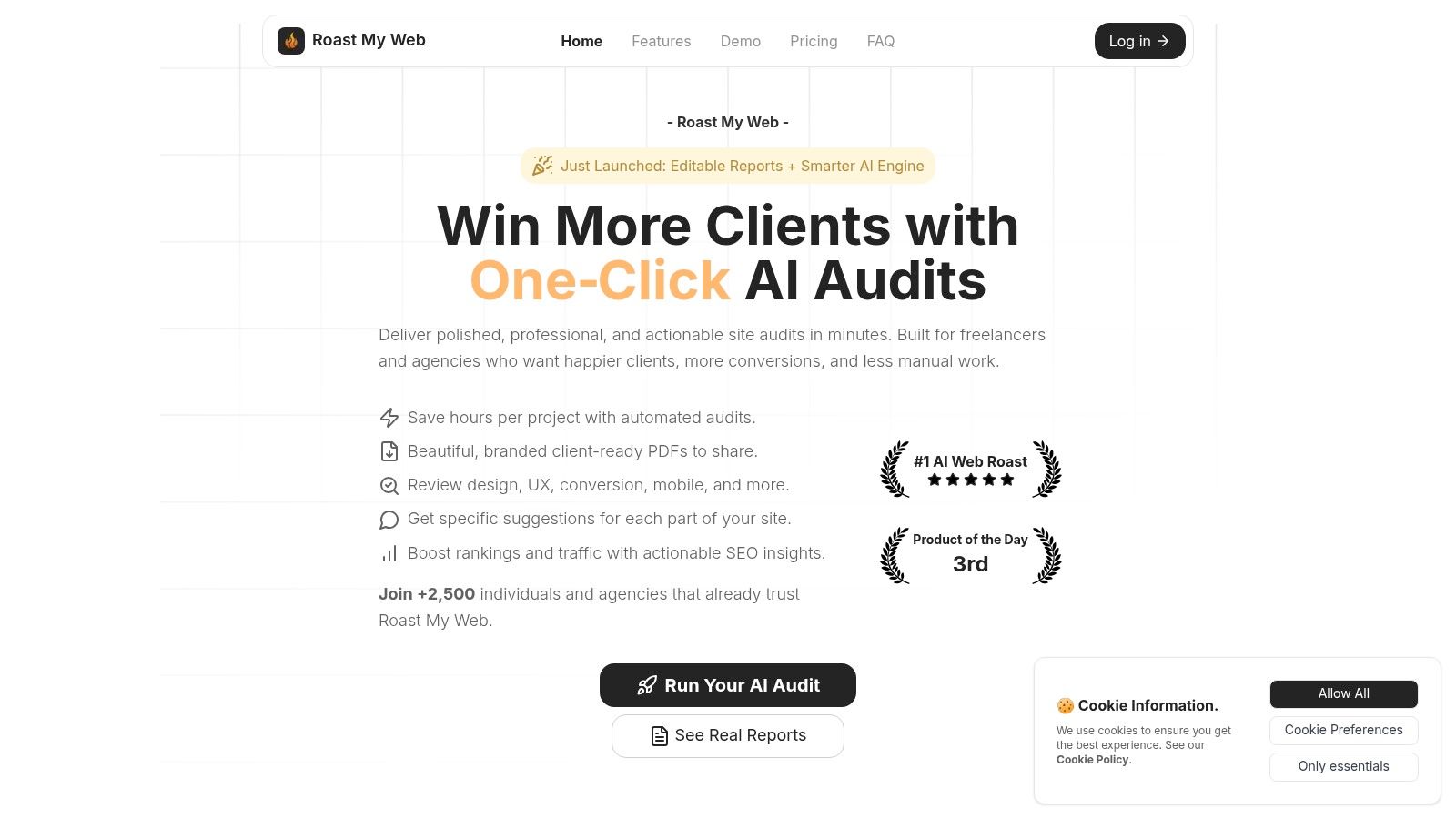
For freelance web designers, Roast My Web offers a competitive advantage by enabling quick identification of design flaws and UX bottlenecks on client websites. Digital marketing agencies can leverage the tool's competitor analysis capabilities to benchmark client performance against rivals and uncover SEO opportunities. Startup founders and solo entrepreneurs can use the platform to conduct comprehensive website performance tests, ensuring their online presence is optimized for conversions. UX/UI specialists will find the detailed section-specific recommendations on usability and accessibility invaluable for improving website design. Learn more about Roast My Web.
Roast My Web simplifies complex technical findings into clear, persuasive language, making it easy for clients to understand the value of your recommendations. Features like multi-site auditing and granular, section-specific recommendations tailored to maximize ROI, are a game-changer for agencies and freelancers alike. The platform also boasts advanced customization options, including on-the-fly report edits and multi-language support. This empowers users to tailor their reports to specific client needs and ensures a professional, branded experience.
Pros:
- Saves hours per project by automating detailed website audits with AI.
- Generates beautiful, branded PDF reports instantly customizable for clients.
- Delivers actionable, section-by-section recommendations covering UX, SEO, conversion, and mobile issues.
- Enables auditing multiple sites at once and competitor benchmarking to improve rankings.
- Affordable and scalable pricing plans starting at $4/month, suitable for freelancers, startups, and agencies.
Cons:
- May struggle with websites protected by captchas or requiring login credentials, which can limit the automation aspects.
- Some features, such as advanced SEO and design insights, could benefit from more engaging multimedia explanations to enhance understanding.
Roast My Web deserves its place on this list of competitor website analysis tools because it offers a compelling combination of power, affordability, and ease of use. By leveraging AI, it simplifies the website audit process, empowers users with actionable insights, and ultimately helps drive better results for clients. The platform's flexible pricing also makes it accessible to a wide range of users, from individual freelancers to large agencies. If you're looking for a competitor website analysis tool that streamlines your workflow and delivers client-ready reports with minimal effort, Roast My Web is definitely worth considering. Visit their website at https://www.roastmyweb.com.
2. Semrush
Semrush is a powerhouse for competitor website analysis, making it an indispensable tool for anyone serious about online marketing. It provides a comprehensive suite of tools to dissect your competitors' strategies across organic search, paid advertising, content marketing, and social media. This allows you to identify opportunities, understand market trends, and ultimately, outrank your competition. For example, a freelance web designer could use Semrush to research the keywords their target clients are searching for, enabling them to optimize their portfolio website and attract more leads. Digital marketing agencies can utilize the competitive analysis tools to provide in-depth reports for their clients, showcasing opportunities for growth and improvement.

Semrush's Domain Overview provides a high-level snapshot of any website's online presence, including estimated traffic, top keywords, and backlink profile. Diving deeper, the Competitive Research tools allow for granular analysis of competitor strategies. Startup founders can leverage this data to understand their competitive landscape and identify potential niches. Solo entrepreneurs can use Semrush to track their own website's performance against their main competitors, ensuring they stay ahead of the curve. UX/UI specialists can gain valuable insights into user behavior on competitor websites, informing their design decisions and improving user experience.
One of Semrush's standout features is the Keyword Gap analysis tool. This feature allows you to compare your keyword rankings against your competitors, revealing keywords they rank for that you don't. This information is crucial for identifying content gaps and optimizing your website to capture more organic traffic. Furthermore, Semrush's backlink analysis tool helps identify both high-quality and potentially harmful backlinks, informing your link-building strategy and protecting your website's reputation. The Traffic Analytics feature offers insights into competitors' traffic sources, allowing you to understand their marketing mix and identify potential opportunities. Finally, the Position Tracking tool allows you to monitor your rankings for target keywords alongside your competitors, providing valuable data for ongoing SEO efforts. Learn more about Semrush for a deeper dive into its functionalities.
Pros:
- Exceptionally comprehensive data across multiple marketing channels.
- Intuitive interface with customizable dashboards and reporting.
- Regular updates and new features added frequently.
- Strong historical data capabilities for trend analysis.
Cons:
- Premium pricing may be prohibitive for small businesses. While specific pricing isn't publicly available, expect to pay a monthly subscription fee.
- Learning curve can be steep due to extensive feature set.
- Some advanced features require higher-tier plans.
- Data limitations in certain geographic regions.
Semrush deserves its place on this list because of its comprehensive approach to competitor website analysis. While the robust feature set may require some initial investment in learning the platform, the insights gained can significantly impact your marketing strategy and online success. For anyone seeking a deep dive into competitor website analysis tools, Semrush is a strong contender. You can explore their offerings further on their website: https://www.semrush.com/.
3. Ahrefs
Ahrefs is a leading competitor website analysis tool that provides a comprehensive suite of features for uncovering your competitors' digital marketing strategies. It's particularly well-regarded for its robust backlink analysis capabilities, allowing you to delve deep into the link profiles of competing websites. This information is invaluable for understanding how they build authority and rank for valuable keywords. Beyond backlinks, Ahrefs allows you to explore competitors' organic search performance, content strategies, and even paid search activities, making it a true all-in-one competitor website analysis tool. This makes it a must-have for anyone serious about competitor analysis, from freelance web designers looking to understand client competition to digital marketing agencies needing in-depth reports.
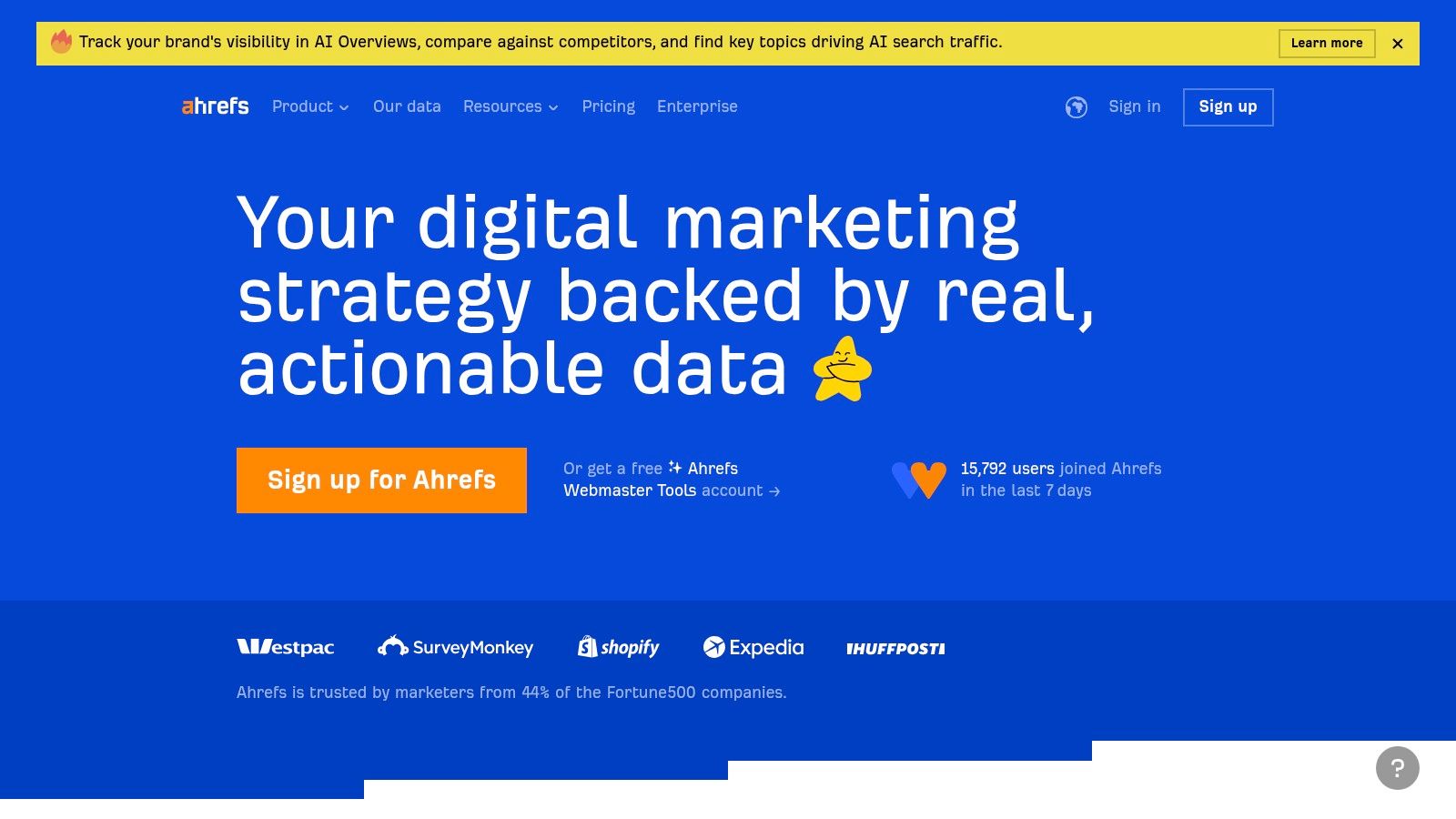
Ahrefs offers several powerful tools for dissecting your competitors' strategies:
-
Site Explorer: This tool is the core of Ahrefs' backlink analysis functionality. Input a competitor's URL, and Site Explorer will reveal their backlink profile, organic search keywords, and estimated traffic. This data can be invaluable for understanding their link building strategies and identifying potential link opportunities for your own website. For startup founders and solo entrepreneurs, this is a goldmine for uncovering successful strategies in their niche.
-
Content Explorer: Want to know what content resonates with your target audience? Content Explorer allows you to find the top-performing content in your niche, including articles, videos, and other formats. See which of your competitors' content pieces are generating the most shares, backlinks, and engagement. This information can help you craft content strategies that outperform the competition. UX/UI specialists can also use this tool to understand what content formats and topics are engaging users in their industry.
-
Keywords Explorer: Uncover the keywords your competitors are ranking for and identify valuable keywords they might be missing. Keywords Explorer provides detailed keyword metrics, including search volume, keyword difficulty, and click-through rate. This tool is essential for SEO and content marketing strategy, allowing you to target keywords that drive traffic and conversions.
-
Rank Tracker: Monitor your competitors' ranking positions for specific keywords and track your own progress. This tool provides valuable insights into the effectiveness of your SEO efforts and helps you identify areas where you can improve your rankings.
-
Site Audit: Analyze the technical SEO aspects of competitor websites, such as site speed, mobile-friendliness, and broken links. This information can help you identify technical issues that may be hindering their performance, and highlight opportunities for your own site optimization.
Pros:
- Extremely detailed backlink analysis with historical data, giving a comprehensive view of competitor link building efforts.
- A massive database of keywords and search volumes provides extensive research opportunities.
- User-friendly interface with actionable insights, making it accessible even for beginners.
- Excellent visualization of complex data allows for easy interpretation and reporting.
Cons:
- Higher pricing compared to some alternatives, potentially making it less accessible for smaller businesses or freelancers with tight budgets.
- No free plan (only a 7-day trial for $7), which can be a barrier to entry for some users.
- Some reports have export limitations, which might be inconvenient for certain reporting needs.
- Can be resource-intensive for comprehensive analysis, especially for large websites.
Website: https://ahrefs.com/
Ahrefs earns its place on this list due to its in-depth backlink analysis and comprehensive suite of competitor research tools. While the pricing might be higher than some alternatives, the data and insights provided can be incredibly valuable for those serious about competitor analysis and improving their online visibility. For digital marketing agencies and larger businesses, the investment is easily justified by the potential ROI generated from actionable competitor insights.
4. Moz Pro
Moz Pro stands out as a comprehensive competitor website analysis tool within its all-in-one SEO toolset. It empowers users to dissect competitor website performance, pinpoint areas for improvement, and monitor progress over time. This makes it a valuable asset for anyone from freelance web designers and digital marketing agencies to startup founders, solo entrepreneurs, and UX/UI specialists looking to gain a competitive edge. By leveraging tools like Link Explorer, Keyword Explorer, and Site Crawl, Moz Pro offers deep insights into competitor strategies, including their ranking tactics, backlink profiles, and on-page optimization efforts. This information is crucial for understanding the competitive landscape and identifying opportunities to outrank competitors.
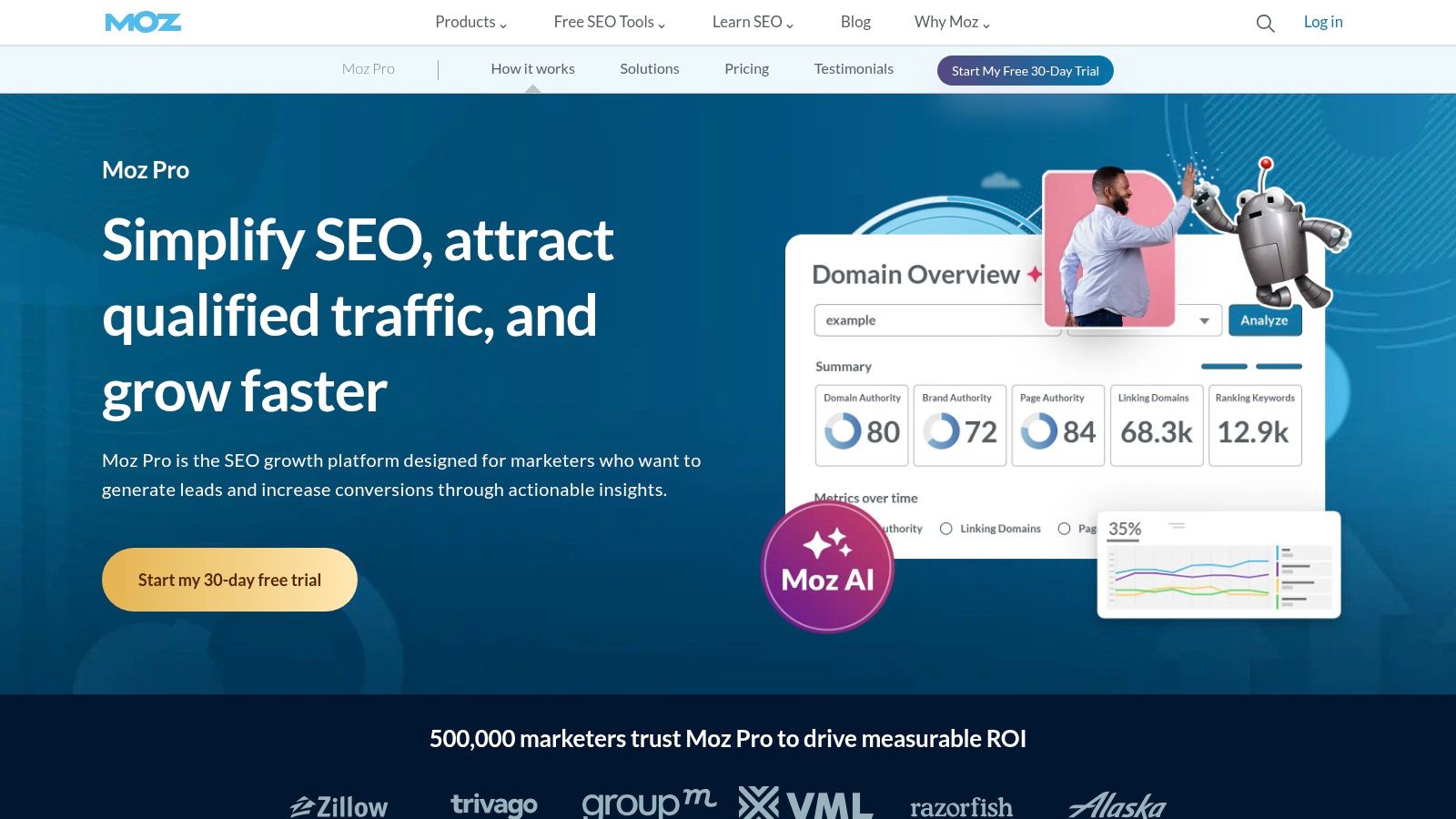
For example, a freelance web designer could utilize Moz Pro to analyze the backlink profiles of competitors' websites. Using Link Explorer, they can identify high-quality websites linking to their competitors and explore potential link-building opportunities for their own clients. Similarly, a digital marketing agency can leverage Keyword Explorer to discover valuable keywords that competitors are targeting, informing their clients' content strategies and SEO campaigns. Learn more about Moz Pro as it relates to website SEO audits. This resource provides a comprehensive checklist that complements the features and functionality of Moz Pro.
Moz Pro's user-friendly interface and rich educational resources make it accessible to SEO beginners, while its advanced features cater to the needs of seasoned SEO professionals. Its proprietary Domain Authority metric provides a quick and easy way to benchmark website strength against competitors. Furthermore, its strong local SEO analysis capabilities make it particularly valuable for businesses targeting specific geographic areas.
Features:
- Link Explorer: Analyze competitors' backlink profiles to identify link-building opportunities and assess the quality of their backlinks.
- Keyword Explorer: Discover high-value keywords that competitors are targeting and uncover new keyword opportunities for your own website.
- On-Page Grader: Evaluate the on-page optimization of competitor websites and identify areas for improvement in your own content.
- Rank Tracker: Monitor competitor keyword positions and track your own ranking progress over time.
- Domain Authority: A proprietary metric that predicts how well a website will rank on search engine result pages (SERPs), providing a benchmark for competitive analysis.
Pros:
- Excellent educational resources for SEO beginners.
- User-friendly interface with intuitive reporting.
- Proprietary metrics like Domain Authority provide quick competitive benchmarking.
- Strong local SEO analysis capabilities.
Cons:
- Smaller link database compared to some competitors like Ahrefs or SEMrush.
- Limited keyword data for certain niche industries or regions.
- Some features may lack the depth available in specialized tools.
- Update frequency for certain metrics can be slower compared to alternatives.
Website: https://moz.com/products/pro
While pricing isn't publicly listed, Moz Pro offers different subscription tiers to suit various needs and budgets. Technical requirements are minimal, requiring only a web browser and internet access. While Moz Pro is a powerful all-in-one tool, users requiring highly specialized features or extremely large datasets might consider supplementing it with tools dedicated to specific areas like backlink analysis or keyword research.
5. SpyFu
SpyFu is a powerful competitor website analysis tool specializing in search marketing intelligence, offering valuable insights into both SEO and PPC strategies. This makes it a crucial tool for anyone looking to gain an edge in the competitive online landscape. Whether you're a freelance web designer optimizing a client's site, a digital marketing agency crafting a winning campaign, or a startup founder looking to outperform the competition, SpyFu can provide the data-driven insights you need. SpyFu allows you to uncover your competitors' most profitable keywords, analyze their ad strategies, and track their organic ranking history, enabling you to make informed decisions about your own marketing efforts.
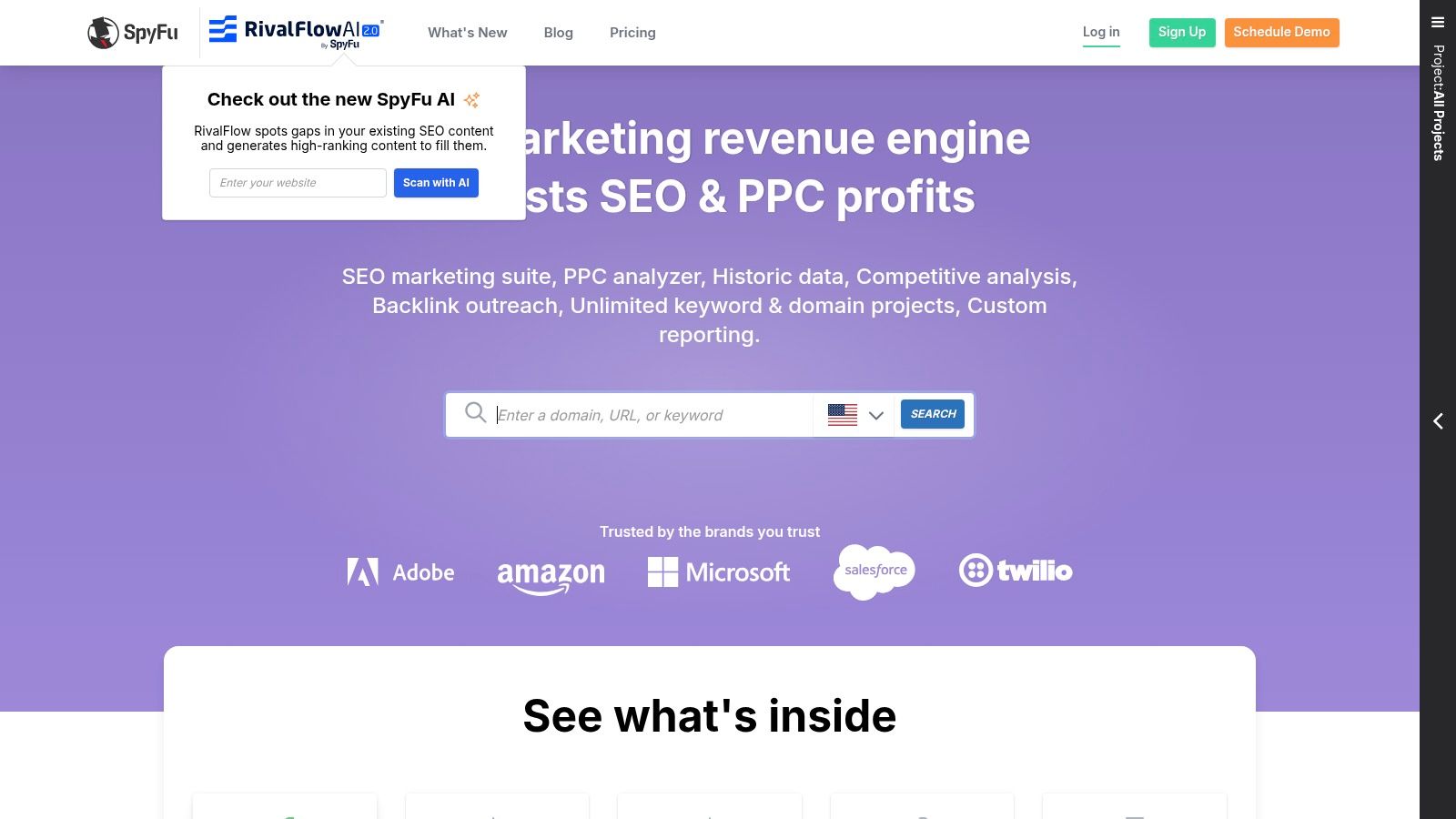
Imagine you're a UX/UI specialist tasked with improving a client's website conversion rate. By using SpyFu, you can identify the keywords driving traffic to competitor sites and see which ones are converting best. This information can then be used to inform your design decisions, ensuring the site is optimized for the right keywords and user intent. Similarly, as a digital marketing agency, you can use SpyFu to analyze a competitor's PPC campaigns, identify their top-performing ad copy, and estimate their ad spend. This allows you to develop more effective campaigns for your clients and allocate your budget more efficiently.
SpyFu offers a range of features designed to support competitor website analysis, including keyword research with competitor rank tracking history, PPC competitor analysis including ad spend estimates and ad copy examples, backlink analysis to uncover competitors' link building strategies, SEO competitor analysis with ranking history, and domain comparison for side-by-side competitor analysis. The platform’s extensive historical data, going back several years, provides valuable context for understanding competitor trends and predicting future performance. This historical data is particularly useful for SEO professionals tracking long-term keyword performance and identifying opportunities for improvement.
Pros:
- Extensive historical data going back several years provides valuable insights into long-term trends.
- Strong focus on both paid and organic search strategies allows for a comprehensive analysis of competitor activities.
- Unlimited search results and data exports on all plans offer flexibility and value.
- More affordable pricing compared to some enterprise competitor website analysis tools makes it accessible to businesses of all sizes.
Cons:
- Primary focus on US and UK markets with limited data for other regions may restrict its usefulness for internationally focused businesses.
- Less comprehensive for non-search marketing channels means you'll need other tools for a complete view of your competition.
- Backlink data is not as extensive as specialized backlink analysis tools, so you might need to supplement this data with other resources.
- The interface can feel cluttered with information, which can be overwhelming for new users.
Website: https://www.spyfu.com/
SpyFu deserves a place on this list of competitor website analysis tools because it provides a robust and affordable solution for businesses seeking to understand and outperform their competition in the search marketing landscape. Its comprehensive features and historical data make it a valuable asset for digital marketing agencies, freelance web designers, startup founders, solo entrepreneurs, and UX/UI specialists alike. While its focus is primarily on search marketing in the US and UK markets, its depth of information and user-friendly interface make it a worthwhile investment for anyone serious about competitor analysis. Setting up SpyFu is straightforward - simply create an account and start researching your competitors. The platform offers various plans to suit different needs and budgets, so you can choose the option that works best for you.
6. SimilarWeb: Uncovering Your Competitors' Digital Strategies
SimilarWeb is a powerful competitor website analysis tool that deserves its place on this list due to its comprehensive digital intelligence platform. It goes beyond basic traffic metrics, offering a deep dive into your competitors' online presence, providing invaluable insights for freelance web designers, digital marketing agencies, startup founders, solo entrepreneurs, and UX/UI specialists alike. Whether you're benchmarking your performance against industry leaders, identifying new market opportunities, or simply trying to understand your competitive landscape, SimilarWeb offers a wealth of actionable data.
Unveiling the Competition:
SimilarWeb provides a holistic view of your competitors' digital strategies by analyzing website traffic and engagement metrics across multiple channels. It allows you to:
- Uncover Traffic Sources: See where your competitors' traffic is coming from (organic search, paid ads, referrals, social media, etc.). This breakdown helps you identify their most successful marketing channels and replicate their strategies. For example, if a competitor is dominating organic search for a specific keyword, you can analyze their content strategy and SEO tactics.
- Understand Audience Demographics and Behavior: Gain insights into your competitors' target audience, including their demographics, interests, and online behavior. This knowledge can inform your own targeting efforts, allowing you to refine your user personas and tailor your messaging to resonate with the same audience. For UX/UI specialists, understanding audience behavior on competitor websites can inspire design improvements and enhance user experience.
- Analyze Industry Trends and Market Share: Benchmark your website's performance against industry averages and identify market share trends. This feature is invaluable for startup founders and solo entrepreneurs looking to assess market opportunities and gauge their competitive positioning.
- Deconstruct Keyword Strategies: Analyze your competitors' organic and paid search keyword strategies. Identify the keywords they are ranking for and the ads they are running. This information can inform your own SEO and PPC campaigns, helping you target valuable keywords and optimize your ad spend.
- Track App Performance: If your competitors have mobile apps, SimilarWeb provides insights into app downloads, usage, and engagement metrics. This is crucial for app developers and marketers looking to understand the competitive landscape and benchmark their app's performance.
Features and Benefits:
SimilarWeb's key features translate into tangible benefits for users:
- Comprehensive Cross-Channel Analytics: Gain a holistic view of your competitors' digital marketing efforts, going beyond just website traffic to include social media, display advertising, email marketing, and more.
- Visualized Market Positioning: Easily understand market trends and competitor performance through intuitive charts and graphs, making complex data digestible and actionable.
- Global Data Coverage: Access data across various industries and geographies, making SimilarWeb a valuable tool for businesses operating in international markets.
Pros and Cons:
- Pros: Comprehensive cross-channel digital analytics, strong visualization of market positioning and trends, global data coverage across various industries, insights beyond search marketing.
- Cons: High pricing for premium tiers with full data access, traffic estimates can vary significantly from actual numbers, limited historical data on lower-tier plans, some industry verticals have less reliable data coverage.
Pricing and Technical Requirements:
SimilarWeb offers a freemium model with limited functionality. Paid plans provide access to more comprehensive data and features. Specific pricing details are available on their website. There are no specific technical requirements to use SimilarWeb, as it's a web-based platform accessible from any modern browser.
Implementation and Setup Tips:
Getting started with SimilarWeb is straightforward. Simply create an account and add the websites you want to analyze. The platform provides intuitive dashboards and reports that are easy to navigate.
Website: https://www.similarweb.com/
SimilarWeb is a robust competitor website analysis tool offering valuable insights for businesses of all sizes. While the premium features come at a cost, the depth and breadth of data provided make it a worthwhile investment for those serious about understanding their competitive landscape and optimizing their digital strategies. By leveraging SimilarWeb's data, you can gain a competitive edge, identify new opportunities, and ultimately achieve greater online success.
7. BuzzSumo
BuzzSumo earns its spot on this list of competitor website analysis tools thanks to its powerful content analysis capabilities. While not strictly a website analyzer in the traditional sense, BuzzSumo offers a unique perspective on competitor activities by focusing on their content marketing strategies. It helps uncover what content resonates with their audience, which influencers they collaborate with, and what topics are trending in your industry. This information is crucial for developing a competitive content strategy and understanding the broader content landscape. This tool is invaluable for freelance web designers looking to understand client competitor content strategies, digital marketing agencies needing to report on competitor content performance, startup founders wanting to carve a content niche, solo entrepreneurs seeking content inspiration, and UX/UI specialists researching content consumption patterns.
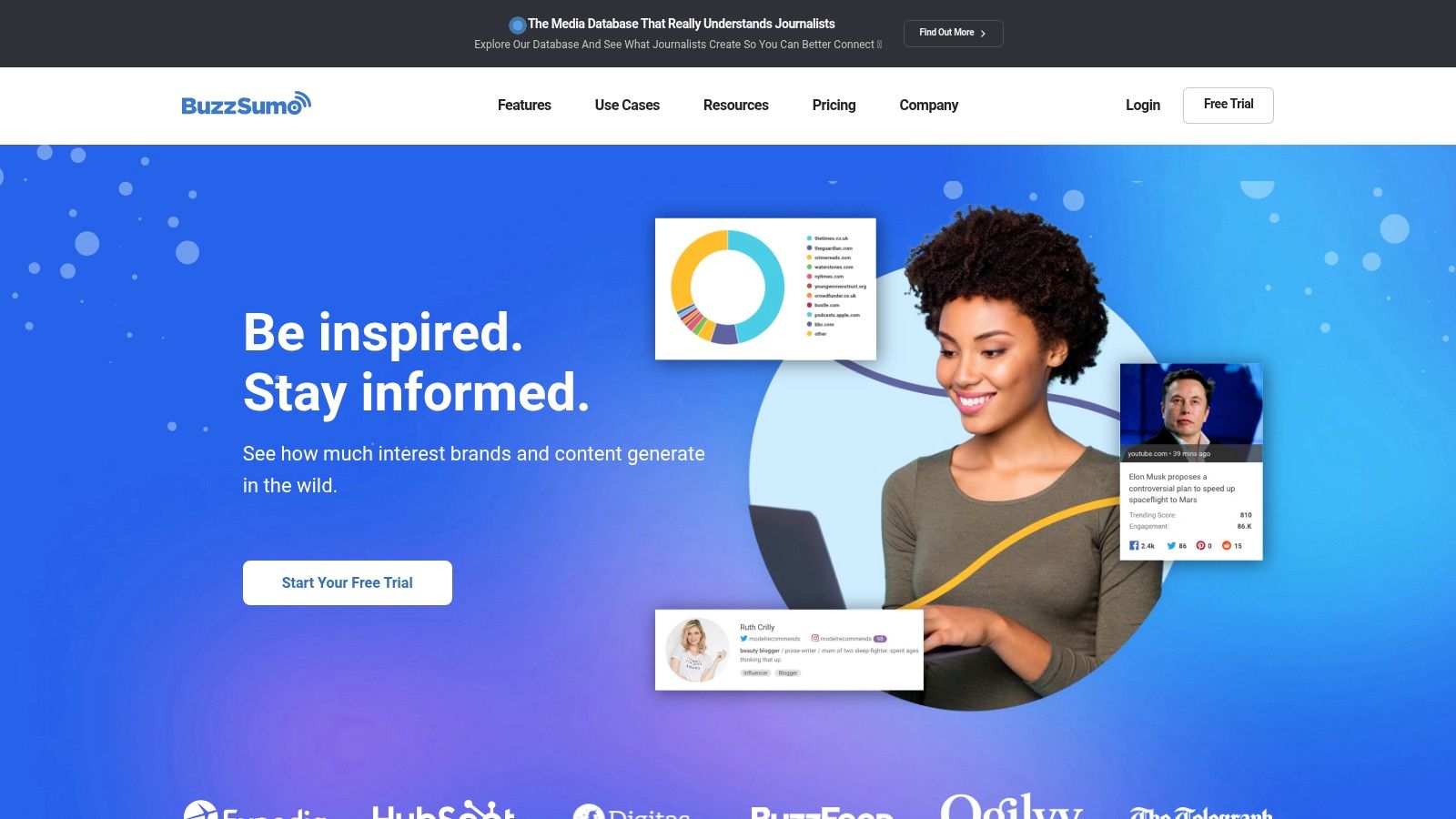
For example, a freelance web designer could use BuzzSumo to analyze a client's competitor's blog posts to identify high-performing topics and content formats. This information could then inform the client's content strategy and website design, leading to more engaging and effective content. Similarly, a digital marketing agency can use BuzzSumo to create detailed reports on competitor content performance, highlighting opportunities and weaknesses in their client's content strategy. Startup founders can leverage the platform to identify underserved content niches and develop unique content offerings that differentiate them from the competition.
Key features of BuzzSumo include its Content Analyzer for discovering top-performing content, Content Research for uncovering trending topics, Monitoring tools for tracking competitor content and mentions, Influencer identification within specific niches, and a Question Analyzer to discover common customer queries. These tools allow for deep dives into competitor content strategies and identification of actionable insights.
Pros:
- Specialized focus on content performance and social engagement: Provides unparalleled insight into how content is performing and resonating on social media.
- Real-time content alerts for competitor activities: Stay informed about what your competitors are publishing and sharing.
- Excellent for identifying content gaps and opportunities: Uncover untapped topics and formats within your industry.
- Easy-to-use interface with actionable insights: Quickly find and interpret data to improve your content strategy.
Cons:
- Limited focus on other marketing channels beyond content: Doesn't provide insights into areas like paid advertising or email marketing.
- Search volume and SEO data less comprehensive than dedicated SEO tools: For in-depth keyword research, you might need additional tools.
- Higher-tier plans needed for historical data and advanced features: Accessing comprehensive data requires a significant investment.
- Some social networks have limited data availability: Data access can vary depending on the social media platform.
Pricing: BuzzSumo offers various pricing tiers, starting from approximately $99/month for the Pro plan, with higher-tier plans providing increased data limits and more advanced features. Contact BuzzSumo directly for the most up-to-date pricing information.
Technical Requirements: BuzzSumo is a cloud-based platform accessible through any web browser.
Implementation Tips: Start by identifying your key competitors and the specific topics you want to analyze. Use BuzzSumo's filtering options to refine your search and focus on the most relevant data. Set up content alerts to stay informed of competitor activity in real-time.
BuzzSumo provides a powerful lens through which to analyze competitor content strategies. By understanding what works for your competitors, you can develop more effective content, improve your website's performance, and gain a competitive edge. Its focus on content makes it a valuable competitor website analysis tool, particularly when combined with other tools that cover different marketing channels. Visit the BuzzSumo website (https://buzzsumo.com/) to learn more and explore its capabilities.
8. Serpstat
Serpstat is a valuable all-in-one SEO platform providing a suite of competitor website analysis tools ideal for search marketing professionals, freelance web designers, digital marketing agencies, startup founders, solo entrepreneurs, and UX/UI specialists looking for a cost-effective yet powerful solution. It offers deep insights into competitor keyword strategies, backlink profiles, PPC campaigns, and content performance, allowing users to identify opportunities and weaknesses, and refine their own strategies based on hard data. This makes Serpstat a worthy addition to our list of top competitor website analysis tools, especially for those seeking a balanced approach between functionality and affordability.
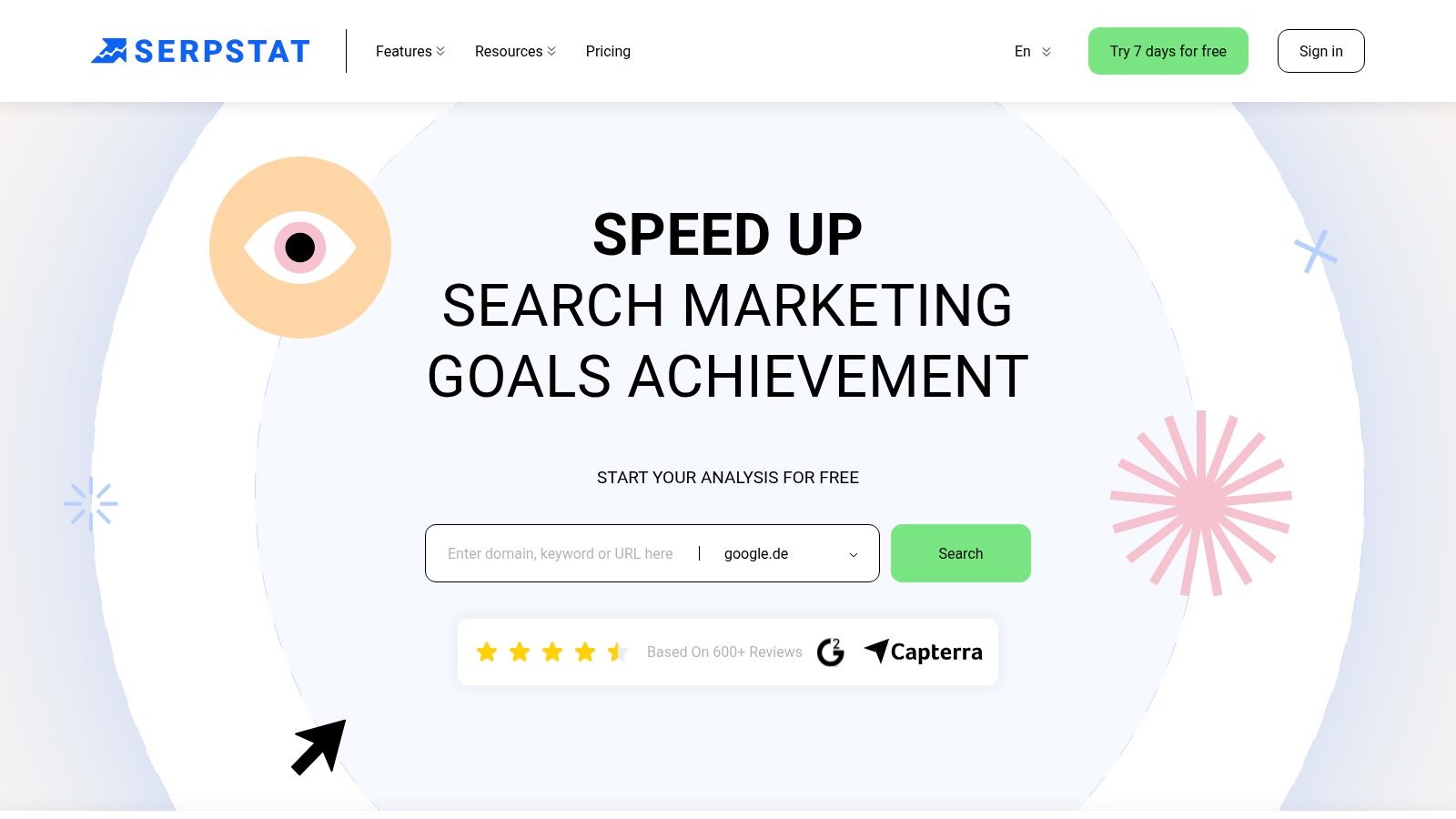
For example, a freelance web designer can use Serpstat's Domain Analysis feature to research the SEO strategies of competing design agencies. By analyzing their top-performing keywords and backlink profiles, the designer can identify relevant keywords to target for their own website and potential link-building opportunities. Similarly, a startup founder can leverage Serpstat's PPC ad research capabilities to analyze competitor ad copy and identify effective strategies for their own paid campaigns. UX/UI specialists can also utilize Serpstat’s site audit tool to compare their technical SEO performance with competitors, revealing areas for improvement in site structure and performance, leading to a better user experience.
Serpstat's key features that facilitate competitor website analysis include:
- Domain Analysis: Offers comprehensive insights into a competitor's website, including traffic sources, top keywords, and backlink profile.
- Keyword Research and Gap Analysis: Identifies keywords targeted by competitors, revealing opportunities to expand your own keyword strategy and close the gap in search visibility.
- Backlink Analysis and Comparison: Allows you to analyze and compare backlink profiles between domains, identifying potential link-building opportunities and assessing the authority of competing websites.
- PPC Ad Research and Competitor Ad Copy Analysis: Provides insights into competitor PPC campaigns, including ad copy, keywords, and landing pages, allowing you to refine your own paid advertising strategies.
- Site Audit Tool: Facilitates technical SEO comparison by identifying technical issues on your site and comparing your site’s health with that of your competitors.
Pros:
- Cost-effective: Offers competitive pricing compared to many enterprise-level SEO tools, making it accessible to smaller businesses and freelancers.
- User-friendly interface: Intuitive navigation makes it easy to access and utilize the platform's features.
- Strong visualization tools: Provides clear and concise visualizations of competitive landscapes, making it easier to understand complex data.
- Comprehensive all-in-one platform: Covers a wide range of SEO needs, including competitor analysis, keyword research, and site auditing.
Cons:
- Database size: Smaller database compared to some premium competitors, which may limit the depth of data available for certain niches or regions.
- Limited historical data: Offers less historical data than more established platforms, which can hinder trend analysis.
- Advanced features require higher-tier plans: Some advanced features are locked behind higher-tier subscription plans.
- Data coverage: While the interface is in English, data coverage is stronger for European markets.
Website: https://serpstat.com/
While pricing details aren't explicitly listed here, Serpstat offers various subscription plans catering to different needs and budgets. Check their website for the most up-to-date pricing information. There are no specific technical requirements to use Serpstat beyond a stable internet connection and a web browser. Compared to similar tools like Ahrefs or SEMrush, Serpstat provides a more affordable alternative, albeit with a slightly smaller database. Setting up an account is straightforward and the platform's intuitive interface allows for quick onboarding.
Competitor Website Analysis Tools Comparison
| Tool | Core Features / Insights | User Experience & Quality ★★★★☆ | Value & Pricing 💰 | Target Audience 👥 | Unique Selling Points / Highlights ✨ |
|---|---|---|---|---|---|
| 🏆 Roast My Web | AI-powered detailed site audits, multi-site & competitor comparison, branded PDF reports | Saves hours, easy-to-understand actionable insights | Starting at $4/month, scalable for agencies | Freelancers, Agencies, Startups | Instant customizable reports, multi-language, tailored recommendations |
| Semrush | SEO toolkit: domain & keyword analytics, backlink & traffic analysis | Comprehensive data, intuitive interface | Premium pricing, may be costly for SMBs | Marketers, Agencies, Enterprises | Extensive marketing channels data, frequent updates |
| Ahrefs | Backlink & competitor analysis, content & keyword explorer, site audits | User-friendly, excellent data visualization | Higher pricing, no free plan | SEO professionals, Agencies | Deep backlink data with historical insight |
| Moz Pro | Link/Keyword Explorer, Site Crawl, Domain Authority metrics | Beginner-friendly, strong educational resources | Mid-range pricing | SEO beginners to pros | Proprietary metrics, local SEO focus |
| SpyFu | SEO & PPC competitor analysis, ad spend estimates, keyword rank history | Affordable, extensive historic data | Affordable compared to enterprise tools | SMBs focused on search marketing | Detailed PPC & organic keyword insights |
| SimilarWeb | Traffic & audience insights, industry trends, multi-channel digital analytics | Strong visualization, global data | High pricing for full access | Enterprises, Market analysts | Holistic online performance data |
| BuzzSumo | Content research, trending topics, influencer & social engagement tracking | Easy-to-use, real-time content alerts | Higher-tier needed for advanced features | Content marketers, Social teams | Focused on content performance and engagement |
| Serpstat | All-in-one SEO platform: keyword, backlink, PPC, site audit | User-friendly, cost-effective | Affordable, especially vs premium tools | SMBs, SEO agencies | Visual competitive landscape, European market strength |
Choosing the Right Competitor Website Analysis Tool
Finding the perfect competitor website analysis tools can feel overwhelming with so many options available. From comprehensive suites like Semrush, Ahrefs, and Moz Pro to more specialized tools like SpyFu, SimilarWeb, BuzzSumo, and Serpstat, each offers unique features and benefits. This article has explored eight powerful tools, highlighting their strengths and weaknesses to help you navigate the selection process. Key takeaways include understanding the importance of analyzing backlink profiles, keyword strategies, content performance, and overall online visibility of your competitors.
To choose the right tool for your needs, consider the depth of analysis required. Do you need granular keyword data, or are you more focused on content trends? What’s your budget? Are you primarily interested in SEO, or do you need to analyze social media performance as well? For smaller businesses and freelancers, a focused tool may be sufficient, while larger agencies might benefit from the expansive capabilities of a full-suite platform. Implementing these tools effectively requires consistent monitoring and analysis. Don't just gather data – translate those insights into actionable strategies to improve your own website and marketing efforts.
By strategically leveraging competitor website analysis tools, you can gain invaluable insights into your competitive landscape, identify opportunities, and ultimately, drive growth for your business. This knowledge empowers you to make data-driven decisions, refine your strategies, and stay ahead of the curve. Ready to get started with a powerful and affordable website analysis tool? Dive deeper into your competitors' online presence with Roast My Web, a valuable tool for uncovering SEO insights and improving your own website's performance. Start your free trial today and discover how Roast My Web can help you gain a competitive edge.


